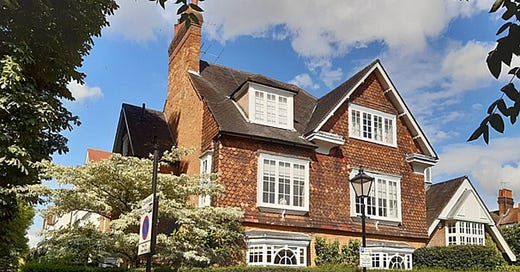I’m writing an essay about the meaning and frequency of sky-views in The Man Who Was Thursday by GK Chesterton. The essay begins with SKY, but here moves on from there solely for this Substack entry below:
"The suburb of Saffron Park lay on the sunset side of London, as red and ragged as a cloud of sunset. It was built of a bright brick throughout", a parody of Bedford Park[1]
In fact, Mr. Lucian Gregory, the anarchic poet, connected the two events.
“It may well be,” he said, in his sudden lyrical manner, “it may well be on such a night of clouds and cruel colours that there is brought forth upon the earth such a portent as a respectable poet. You say you are a poet of law; I say you are a contradiction in terms. I only wonder there were not comets and earthquakes on the night you appeared in this garden.”
The man with the meek blue eyes and the pale, pointed beard endured these thunders with a certain submissive solemnity.’
…Gregory resumed in high oratorical good humour.
“An artist is identical with an anarchist,” he cried… “The man who throws a bomb is an artist, because he prefers a great moment to everything. He sees how much more valuable is one burst of blazing light, one peal of perfect thunder, than the mere common bodies of a few shapeless policemen. An artist disregards all governments, abolishes all conventions. The poet delights in disorder only. If it were not so, the most poetical thing in the world would be the Underground Railway.”
“So it is,” said Mr. Gabriel Syme.
“Nonsense!” said Lucian Gregory…. “Why do all the clerks and navvies in the railway trains look so sad and tired, so very sad and tired? I will tell you. It is because they know that the train is going right. It is because they know that whatever place they have taken a ticket for that place they will reach. It is because after they have passed Sloane Square they know that the next station must be Victoria, and nothing but Victoria.”
“It is you who are unpoetical,” replied the poet Syme. “If what you say of clerks is true…. The rare, strange thing is to hit the mark; the gross, obvious thing is to miss it. …Is it not epical when man with one wild engine strikes a distant station? Chaos is dull; because in chaos the train might indeed go anywhere, to Baker Street or to Bagdad. But man is a magician, and his whole magic is in this, that he does say Victoria, and lo! it is Victoria. No, take your books of mere poetry and prose; let me read a time table, with tears of pride.
…“Must you go?” inquired Gregory sarcastically.
“I tell you,” went on Syme with passion, “that every time a train comes in I feel that it has broken past batteries of besiegers, and that man has won a battle against chaos. You say contemptuously that when one has left Sloane Square one must come to Victoria. I say that one might do a thousand things instead, and that whenever I really come there I have the sense of hairbreadth escape. And when I hear the guard shout out the word ‘Victoria,’ it is not an unmeaning word. It is to me the cry of a herald announcing conquest. It is to me indeed ‘Victoria’; it is the victory of Adam.”
Gregory wagged his heavy, red head with a slow and sad smile.
…
The Man Who Was Thursday
Another of Chesterton’s character has a couple of rants on rich people as misers, and fake humility in eating beans and dressing down.
In “The Man Who Was Thursday” the other character paints the rich as being anarchists.
“You’ve got that eternal idiotic idea that if anarchy came it would come from the poor. Why should it? The poor have been rebels, but they have never been anarchists; they have more interest than anyone else in there being some decent government. The poor man really has a stake in the country. The rich man hasn’t; he can go away to New Guinea in a yacht. The poor have sometimes objected to being governed badly; the rich have always objected to being governed at all. Aristocrats were always anarchists, as you can see from the barons’ wars.”
“As a lecture on English history for the little ones,” said Syme [another character] , “this is all very nice; but I have not yet grasped its application.”
“Its application is,” said his informant, “that most of old Sunday’s right-hand men are South African and American millionaires. That is why he has got hold of all the communications….”
I posted this last as a comment on Demotivations With Anne.




